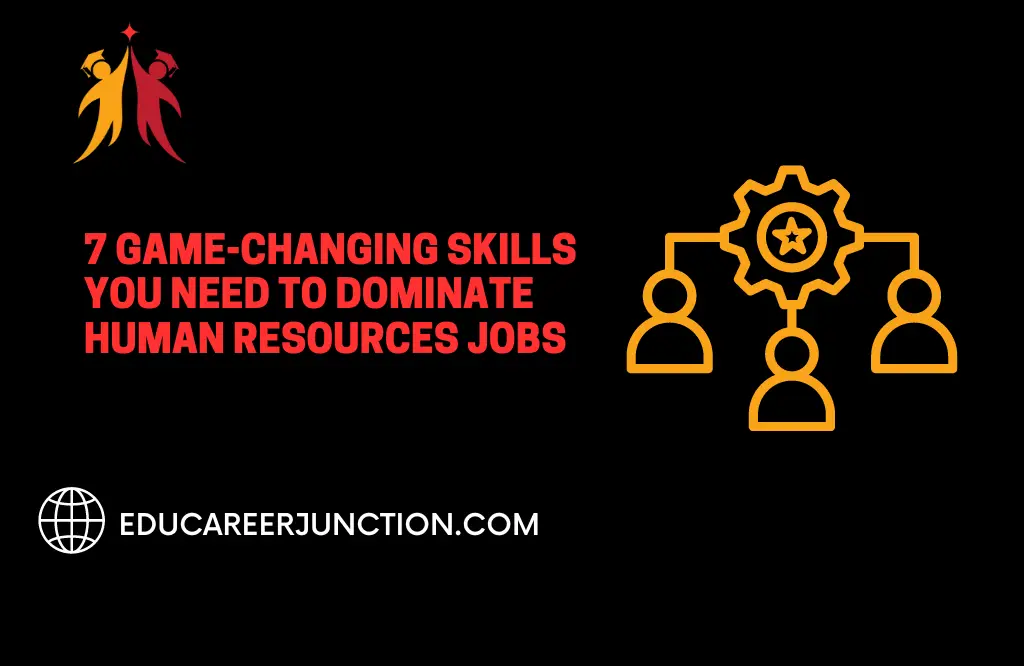Human Resources (HR) is the backbone of every successful organization. As companies across the globe continue to evolve, the demand for highly skilled HR professionals is greater than ever before. To excel in human resources jobs, professionals need to cultivate a diverse range of skills. These skills not only help manage employees more effectively but also ensure the overall growth and sustainability of the business.
In this comprehensive guide, we explore seven game-changing skills that every HR professional must master to dominate the field. From communication to data analysis, these essential capabilities will set you apart from the competition and ensure you stay ahead in this dynamic field.
1. Exceptional Communication Skills
The heart of human resources jobs is communication. HR professionals act as the bridge between employees and management. Whether it’s conducting interviews, resolving conflicts, or delivering company-wide announcements, clear and effective communication is key. Being able to convey ideas and expectations in a precise manner is critical to maintaining harmony within the organization.
Why Communication is Crucial in human resources jobs
- Interpersonal Communication: Building relationships with employees and management ensures a positive work environment.
- Conflict Resolution: HR professionals often act as mediators in workplace disputes. Being able to listen actively and offer practical solutions helps in diffusing tension.
- Employee Engagement: Regular and transparent communication boosts employee morale, ensuring they feel valued and informed.
Without strong communication skills, even the most talented HR professional may struggle to maintain the trust and respect of both employees and leaders.
2. Advanced Recruitment and Talent Acquisition Strategies

Hiring the right people is one of the most important responsibilities of an HR professional. Advanced recruitment and talent acquisition strategies allow HR managers to attract, interview, and hire top talent that aligns with the company’s goals and culture. Human resources jobs are increasingly focusing on proactive recruitment methods, including social recruiting, talent pipelines, and data-driven hiring processes.
Essential Recruitment Tactics to Master
- Employer Branding: Promoting the company as an ideal workplace attracts high-caliber candidates who share your organization’s values.
- Behavioral Interviewing: Instead of simply assessing qualifications, HR professionals should analyze how potential hires handle challenges and interact with others.
- Leveraging Technology: Using Applicant Tracking Systems (ATS), AI-based recruitment tools, and social media helps streamline the hiring process and improve candidate experience.
Mastering these advanced recruitment strategies will position you as a go-to HR expert who knows how to bring in the best talent for your company.
3. Emotional Intelligence and Empathy
Emotional intelligence (EI) is the ability to understand and manage your own emotions, as well as those of others. In human resources jobs, where interactions with people are constant, emotional intelligence is an indispensable skill. HR professionals with high EI can recognize emotional cues, respond appropriately, and create an environment where employees feel heard and valued.
How Emotional Intelligence Enhances HR Performance
- Empathetic Leadership: Understanding employee concerns and offering support fosters a healthy workplace culture.
- Better Decision-Making: High EI allows HR professionals to make informed decisions, balancing organizational needs with employee well-being.
- Conflict Mitigation: HR professionals with strong emotional intelligence are more effective at resolving conflicts and preventing potential issues from escalating.
human resources jobs are centered on people, those who exhibit empathy and emotional intelligence will be better equipped to manage both individual and organizational dynamics.
4. Mastery of Labor Laws and Compliance
One of the core responsibilities of human resources jobs is ensuring that the organization adheres to legal standards and labor laws. In today’s business landscape, staying up-to-date with changing regulations and maintaining compliance is more critical than ever.

Key Areas of Labor Law Expertise
- Employee Rights and Benefits: HR must ensure that employees receive their legal entitlements, such as minimum wage, overtime, and leave policies.
- Discrimination and Harassment: Knowing anti-discrimination laws and being able to enforce a harassment-free environment is essential.
- Health and Safety Regulations: Ensuring compliance with workplace safety standards helps prevent legal liabilities and protects employees.
A deep understanding of labor laws and compliance is essential for HR professionals to safeguard both the company and its employees.
5. Strategic Thinking and Leadership
Today’s human resources jobs are not just about administration; they involve strategic thinking that drives business success. HR professionals who demonstrate strong leadership skills and align HR strategies with business objectives play a key role in shaping the company’s future.
How to Apply Strategic Thinking in HR
- Workforce Planning: Anticipating future staffing needs and succession planning ensures that the company has the talent necessary for growth.
- Change Management: HR must guide organizations through periods of change, whether it’s a merger, acquisition, or restructuring, by developing plans that minimize disruption.
- Data-Driven Decisions: By leveraging HR analytics, professionals can make informed decisions about employee performance, retention, and engagement.
In the world of human resources jobs, strategic thinking is a crucial skill that enables HR professionals to contribute directly to the company’s success.
6. Proficiency in HR Technology and Analytics
The role of HR is becoming increasingly data-driven. HR professionals now have access to a wide range of technologies that allow them to track and analyze data related to employee performance, engagement, and retention. Proficiency in HR technology and analytics is crucial for optimizing HR processes and making data-informed decisions.
Important HR Technologies to Master
- HR Information Systems (HRIS): Managing employee data, payroll, benefits, and more through HRIS systems enhances productivity and accuracy.
- HR Analytics: Analyzing metrics such as employee turnover, hiring times, and training effectiveness provides valuable insights that can improve HR practices.
- Performance Management Software: Monitoring employee performance through software tools helps HR professionals identify trends and make necessary interventions.
Those who embrace HR technology are better equipped to lead their organizations in a data-driven world, ensuring they stay competitive and innovative.
7. Effective Training and Development Programs

One of the most impactful roles of an HR professional is facilitating employee development through training programs. By creating robust training and development initiatives, HR can enhance the skills of the workforce, improve employee satisfaction, and increase retention.
Designing Impactful Training Programs
- Needs Assessment: Identifying the skills gaps within the organization allows HR to tailor training programs that directly address these needs.
- Continuous Learning: Encouraging a culture of continuous learning ensures that employees are constantly improving their skills, keeping the company ahead of industry trends.
- Leadership Development: Offering leadership training helps groom the next generation of company leaders, fostering internal growth and promoting from within.
HR professionals who excel at designing and implementing training programs not only improve individual employee performance but also contribute to the overall success of the company.
Conclusion
In today’s competitive landscape, excelling in human resources jobs requires more than just basic HR knowledge. It demands a well-rounded skill set that includes communication, strategic thinking, technology, emotional intelligence, and legal expertise. By mastering these seven game-changing skills, HR professionals can take their careers to the next level, becoming indispensable assets to their organizations.
FAQs about Human Resources Jobs
What are the key responsibilities of an HR professional?
HR professionals handle a wide range of tasks, including recruitment, employee relations, benefits administration, compliance with labor laws, training and development, conflict resolution, and performance management. They play a crucial role in fostering a positive work environment, ensuring legal compliance, and aligning HR practices with business goals.
What qualifications do you need for a career in human resources?
To pursue a career in human resources, a bachelor’s degree in HR, business administration, psychology, or a related field is typically required. Many HR professionals also benefit from obtaining certifications such as SHRM-CP (Society for Human Resource Management-Certified Professional) or PHR (Professional in Human Resources). Strong communication, problem-solving, and leadership skills are also essential.
Why is emotional intelligence important in HR?
Emotional intelligence is critical in HR because it helps professionals manage interpersonal relationships effectively. It allows HR professionals to understand employee emotions, respond empathetically, and handle workplace conflicts with care. High emotional intelligence also improves communication, decision-making, and employee engagement.
What HR technologies should I be familiar with?
HR professionals should be proficient in using HR Information Systems (HRIS), Applicant Tracking Systems (ATS), performance management software, and HR analytics tools. Familiarity with tools like Workday, BambooHR, and SAP SuccessFactors can significantly enhance an HR professional’s ability to manage employee data, recruitment processes, and overall HR operations.
How can I improve my recruitment skills as an HR professional?
Improving recruitment skills involves staying up-to-date with the latest trends and technologies in talent acquisition. Developing a strong employer brand, utilizing behavioral interviewing techniques, and leveraging data and AI for recruitment decisions can enhance your ability to attract and hire top talent. Building a solid talent pipeline is also crucial for long-term recruitment success.
What is the role of HR in strategic business planning?
HR plays a key role in strategic business planning by aligning workforce planning with business objectives. HR professionals contribute by developing strategies for talent acquisition, leadership development, succession planning, and change management. They also use data-driven insights to inform decisions that support organizational growth and stability.
How can HR professionals stay compliant with labor laws?
HR professionals must stay current with labor laws by regularly attending legal training and seminars, subscribing to legal updates, and consulting with labor law experts. Ensuring compliance requires a deep understanding of local, state, and federal regulations, as well as a commitment to enforcing company policies that reflect legal standards.
Lastly, visit our Digital Marketing Jobs: Top Career Opportunities & Growth for more insightful guides like this.
